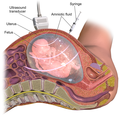Prenatal testing
(Redirected from Antenatal screening)
Prenatal diagnosis refers to the identification of diseases or conditions in a fetus or embryo before its birth. The primary objective is to detect birth defects such as neural tube defects, chromosome abnormalities, genetic diseases, and other conditions. Prenatal diagnostic methods can be either non-invasive or invasive.
Reasons for Prenatal Diagnosis
- Early Intervention: Enables parents to plan for any health needs of the baby before birth.
- Emotional Preparation: Allows parents to seek counselling, reducing shock and other reactions post-birth.
- Medical Preparedness: Enables healthcare staff to be ready with suitable treatments during and post delivery.
- Abortion Decision: Gives parents the option to abort if they so choose.
- Genetic Considerations: In families with inheritable genetic conditions, prenatal diagnosis can detect chromosome abnormalities or specific genetic problems.
Risk Factors for Prenatal Testing
- Age of the pregnant woman (e.g., over 35).
- History of premature babies or babies with defects.
- Maternal health conditions like high blood pressure, lupus, or diabetes.
- Ethnic backgrounds of partners prone to genetic disorders.
Methods of Prenatal Diagnosis
Non-Invasive Methods
- External Examination: Feeling the mother's abdomen.
- Ultrasound Detection: Scans to confirm pregnancy dates, twin detection, check for abnormalities, or identify risks of disorders like Down's syndrome.
- AFP Screening: Checks levels of alpha fetoprotein, β-hCG, and estriol in maternal serum.
- Detection of Fetal Blood Cells in Maternal Blood: Allows potential sampling of baby's DNA.
Invasive Methods
- Chorionic Villus Sampling (CVS): Early sampling and testing of the chorionic villus but carries higher risk.
- Amniocentesis: Sampling of amniotic fluid to test floating baby cells.
- Embroscopy and Fetoscopy: Observation or sampling of blood/tissue using a probe and camera.
Ethical and Practical Issues
- Deciding between continuation of pregnancy or abortion after testing.
- Assessing the risks versus benefits of invasive prenatal diagnosis.
- Concerns about potential societal preferences for certain traits in offspring.
- The impact of false positives and negatives on parents' mental well-being.
- Decisions related to treatment or surgery options for detected abnormalities.
- Assessing societal pressures on women's choices regarding prenatal testing.
- Evaluating the role of genetic counseling in aiding parents' decisions.
See Also
- Neural tube defects
- Chromosome abnormalities
- Genetic counseling
- Amniocentesis
- Ultrasound
- Amniotic stem cell bank
- Amniotic stem cells
- Chorionic villi
- Genetic counseling
- Newborn screening
- DNA testing
External links
- Our Bodies Ourselves chapter on Prenatal Testing and Disability Rights
- Prenatal Tests and Why Are They Important? - March Of Dimes
| Pregnancy and childbirth | ||||||||||
|---|---|---|---|---|---|---|---|---|---|---|
|
| Tests and procedures relating to pregnancy and childbirth | ||||||||||||||||
|---|---|---|---|---|---|---|---|---|---|---|---|---|---|---|---|---|
|
Transform your life with W8MD's budget GLP-1 injections from $125.
W8MD offers a medical weight loss program to lose weight in Philadelphia. Our physician-supervised medical weight loss provides:
- Most insurances accepted or discounted self-pay rates. We will obtain insurance prior authorizations if needed.
- Generic GLP1 weight loss injections from $125 for the starting dose.
- Also offer prescription weight loss medications including Phentermine, Qsymia, Diethylpropion, Contrave etc.
NYC weight loss doctor appointments
Start your NYC weight loss journey today at our NYC medical weight loss and Philadelphia medical weight loss clinics.
- Call 718-946-5500 to lose weight in NYC or for medical weight loss in Philadelphia 215-676-2334.
- Tags:NYC medical weight loss, Philadelphia lose weight Zepbound NYC, Budget GLP1 weight loss injections, Wegovy Philadelphia, Wegovy NYC, Philadelphia medical weight loss, Brookly weight loss and Wegovy NYC
|
WikiMD's Wellness Encyclopedia |
| Let Food Be Thy Medicine Medicine Thy Food - Hippocrates |
Medical Disclaimer: WikiMD is not a substitute for professional medical advice. The information on WikiMD is provided as an information resource only, may be incorrect, outdated or misleading, and is not to be used or relied on for any diagnostic or treatment purposes. Please consult your health care provider before making any healthcare decisions or for guidance about a specific medical condition. WikiMD expressly disclaims responsibility, and shall have no liability, for any damages, loss, injury, or liability whatsoever suffered as a result of your reliance on the information contained in this site. By visiting this site you agree to the foregoing terms and conditions, which may from time to time be changed or supplemented by WikiMD. If you do not agree to the foregoing terms and conditions, you should not enter or use this site. See full disclaimer.
Credits:Most images are courtesy of Wikimedia commons, and templates, categories Wikipedia, licensed under CC BY SA or similar.
Translate this page: - East Asian
中文,
日本,
한국어,
South Asian
हिन्दी,
தமிழ்,
తెలుగు,
Urdu,
ಕನ್ನಡ,
Southeast Asian
Indonesian,
Vietnamese,
Thai,
မြန်မာဘာသာ,
বাংলা
European
español,
Deutsch,
français,
Greek,
português do Brasil,
polski,
română,
русский,
Nederlands,
norsk,
svenska,
suomi,
Italian
Middle Eastern & African
عربى,
Turkish,
Persian,
Hebrew,
Afrikaans,
isiZulu,
Kiswahili,
Other
Bulgarian,
Hungarian,
Czech,
Swedish,
മലയാളം,
मराठी,
ਪੰਜਾਬੀ,
ગુજરાતી,
Portuguese,
Ukrainian
Contributors: Prab R. Tumpati, MD



